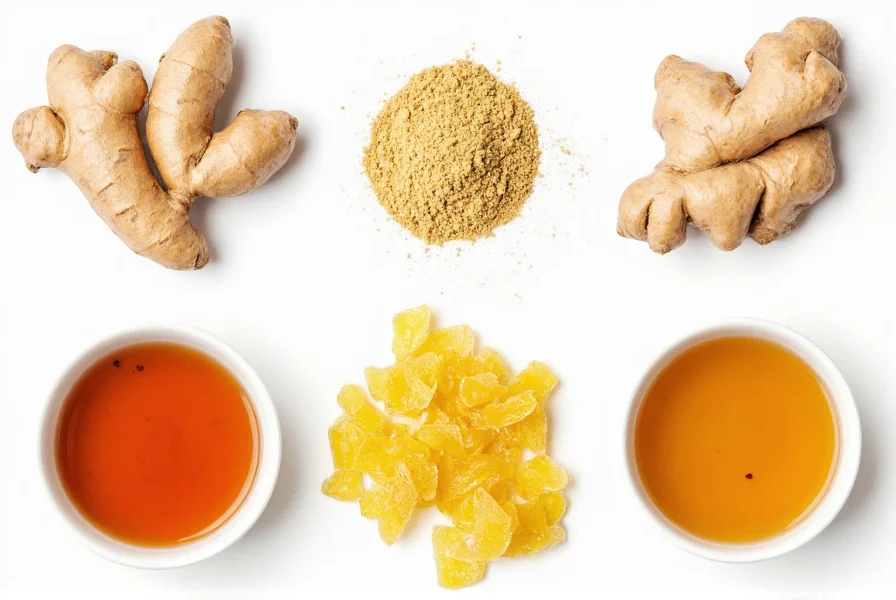Ginger root (Zingiber officinale) has been used for centuries in traditional medicine across Asian and Middle Eastern cultures. Modern science now validates many of these historical uses while revealing new therapeutic applications. This comprehensive analysis examines the evidence behind ginger's health effects, appropriate consumption levels, and important considerations for different populations.

The Science Behind Ginger's Health Properties
Ginger contains over 400 distinct chemical compounds, with gingerols and shogaols being the most biologically active. These compounds give ginger its characteristic pungency and therapeutic properties. Unlike many herbal remedies that rely on a single active ingredient, ginger's effectiveness stems from the synergistic interaction of multiple compounds working together.
Research published in the Journal of Medicinal Food demonstrates that ginger's anti-inflammatory effects operate through multiple pathways, inhibiting both cyclooxygenase and 5-lipoxygenase enzymes. This dual mechanism makes ginger particularly effective for reducing inflammation associated with osteoarthritis and muscle soreness after exercise.
| Nutrient | Amount per 10g Fresh Ginger | % Daily Value |
|---|---|---|
| Calories | 8 kcal | 0.4% |
| Carbohydrates | 2g | 0.7% |
| Dietary Fiber | 0.2g | 0.8% |
| Vitamin C | 0.7mg | 0.8% |
| Magnesium | 4.3mg | 1% |
| Potassium | 38mg | 1% |
Documented Health Benefits of Ginger Root
Nausea and Digestive Support
Ginger root benefits for digestive health are among the most well-documented. Multiple clinical trials confirm ginger's effectiveness against various forms of nausea including morning sickness, chemotherapy-induced nausea, and motion sickness. A comprehensive review in Obstetrics & Gynecology found that 1-1.5 grams of ginger daily significantly reduced pregnancy-related nausea without adverse effects.
For digestive support, ginger stimulates saliva, bile, and gastric enzymes while accelerating gastric emptying. This makes it particularly helpful for people experiencing indigestion or functional dyspepsia. The European Medicines Agency officially recognizes ginger as a traditional herbal remedy for mild digestive complaints.
Inflammation and Pain Management
Research examining ginger for inflammation shows promising results for managing osteoarthritis and menstrual pain. A randomized controlled trial published in Arthritis & Rheumatism found that participants with knee osteoarthritis who took 250mg of ginger extract four times daily experienced significantly less pain during movement compared to placebo.
The anti-inflammatory effects of ginger work differently than NSAIDs, making it a valuable complementary approach. Unlike pharmaceutical options, ginger doesn't carry the same risk of stomach ulcers or kidney damage when used appropriately.
Cardiovascular Health Support
Emerging research suggests ginger may support cardiovascular health through multiple mechanisms. Studies indicate ginger can help lower blood pressure by promoting vasodilation and reducing oxidative stress in blood vessels. Research in the Journal of Cardiovascular Pharmacology demonstrated that ginger supplementation significantly reduced LDL cholesterol and triglycerides in participants with hyperlipidemia.
Understanding Ginger Root Side Effects and Limitations
While ginger is safe for most people, understanding potential ginger root side effects is crucial for responsible consumption. The most common issues occur with excessive intake (more than 4 grams daily) and include:
| Side Effect | Typical Trigger | Prevention Strategy |
|---|---|---|
| Heartburn | Consuming more than 2g at once | Take with food, reduce single dose |
| Mouth irritation | Raw ginger consumption | Use cooked or dried forms |
| Blood thinning | Combining with anticoagulants | Consult physician before use |
| Low blood sugar | High doses with diabetes medication | Monitor glucose levels closely |
Recommended Consumption Guidelines
Determining how much ginger should I consume daily depends on your health goals and individual factors. The generally accepted safe range is:
- General wellness: 1-2 grams of fresh ginger daily (about a 1-inch piece)
- Nausea relief: 250-500mg powdered ginger or 1-2 teaspoons fresh grated ginger
- Inflammation management: 1-1.5 grams of standardized extract daily
Fresh ginger vs dried ginger benefits differ slightly due to changes in active compounds during processing. Fresh ginger contains more gingerols, while dried or cooked ginger develops more shogaols, which are more potent but less stable. For maximum benefit, consider rotating between fresh and dried forms.

Special Population Considerations
Pregnancy: Ginger is generally considered safe during pregnancy for nausea relief at doses up to 1 gram daily. However, consult your healthcare provider before regular use, especially during the first trimester.
Surgery: Discontinue ginger at least one week before scheduled surgery due to potential blood-thinning effects.
Medication interactions: Ginger may interact with blood thinners, diabetes medications, and certain blood pressure drugs. Always discuss ginger supplementation with your physician if taking prescription medications.
Practical Ways to Incorporate Ginger
Maximizing ginger root nutritional value comes down to proper preparation. Try these evidence-based methods:
- Ginger tea: Steep 1-2 teaspoons grated fresh ginger in hot water for 10 minutes
- Cooking: Add to stir-fries, soups, or marinades (cooking preserves some benefits)
- Smoothies: Blend 1-inch piece with fruits and greens for digestive support
- Preserved: Use crystallized ginger for nausea (watch sugar content)
For those wondering if ginger lower blood pressure, moderate consumption may provide cardiovascular benefits, but it shouldn't replace prescribed hypertension treatments without medical supervision.
Conclusion: Balancing Ginger's Benefits and Considerations
Ginger root offers significant health benefits supported by scientific research, particularly for digestive health, inflammation management, and nausea relief. When consumed in appropriate amounts, it's a valuable addition to a healthy diet for most people. However, like any bioactive compound, it requires mindful consumption considering individual health conditions and medication use.
The key to maximizing ginger's benefits while minimizing potential side effects lies in moderation and awareness of your personal health context. For specific health concerns, consult with a healthcare provider to determine if ginger supplementation aligns with your treatment plan.
How much ginger should I consume daily for health benefits?
For general wellness, 1-2 grams of fresh ginger daily (about a 1-inch piece) is recommended. For specific conditions like nausea, 250-500mg of powdered ginger or 1-2 teaspoons of fresh grated ginger may be used. Do not exceed 4 grams total per day without medical supervision.
Can ginger help with morning sickness during pregnancy?
Yes, research shows ginger can effectively reduce pregnancy-related nausea. Studies indicate 1-1.5 grams of ginger daily significantly decreases nausea symptoms without adverse effects. However, pregnant women should consult their healthcare provider before regular use, especially during the first trimester.
What are the potential side effects of consuming too much ginger?
Excessive ginger consumption (more than 4 grams daily) may cause heartburn, mouth irritation, diarrhea, or mild stomach discomfort. Ginger can also interact with blood thinners and diabetes medications. People with gallstones should consult a doctor before using ginger supplements as it may increase bile production.
Is fresh ginger more beneficial than dried ginger?
Both forms offer benefits but contain different active compounds. Fresh ginger contains more gingerols, while dried or cooked ginger develops more shogaols, which are more potent anti-inflammatory compounds but less stable. For maximum benefit, consider using both forms as they provide complementary effects.
Can ginger interact with medications I'm taking?
Yes, ginger may interact with blood thinners like warfarin, increasing bleeding risk. It can also enhance the effects of diabetes medications, potentially causing low blood sugar, and may amplify blood pressure medications. Always consult your healthcare provider before adding ginger supplements to your regimen if you take prescription medications.











 浙公网安备
33010002000092号
浙公网安备
33010002000092号 浙B2-20120091-4
浙B2-20120091-4